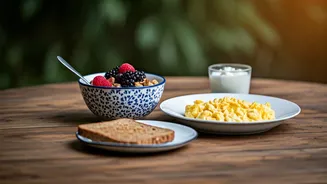Breakfast: The Foundation
For seniors, breakfast isn't just a meal; it's the launchpad for a day filled with energy and vitality. As we age, our bodies require meals packed with nutrients that support heart health, brain function,
and muscle maintenance. A well-balanced breakfast can stabilize blood sugar, enhancing cognitive performance and providing essential vitamins and minerals, which are crucial for healthy aging. By choosing the right foods, seniors can promote satiety, avoid mid-morning fatigue, and ensure comfortable digestion. Oatmeal, Greek yogurt, eggs, whole-grain bread, fresh fruits, and nuts are all excellent choices, providing protein, fiber, healthy fats, and antioxidants in a satisfying meal. These nutrient-rich foods will help older adults enjoy sustained energy and a better overall quality of life.
Nourishing Breakfast Choices
A diet rich in nutrients can support energy levels, maintain a healthy weight, and lower the risk of chronic diseases. Including plenty of vegetables and fruits, whole grains, protein sources (like lean meats, eggs, beans, and dairy), as well as healthy fats from nuts, seeds, avocados, and fish is essential. These foods help seniors stay energized, support heart and brain health, and promote overall well-being. Focusing on these elements ensures a well-rounded and effective approach to nutrition.
Oatmeal: Heart Champion
Oatmeal is an excellent breakfast choice for seniors because it's rich in soluble fiber. This type of fiber helps lower cholesterol levels and regulate blood sugar, reducing the risk of heart disease and type 2 diabetes. Opting for steel-cut or rolled oats is better than instant varieties because they release energy more slowly and usually have less added sugar. According to a study, eating oats with soluble fiber can reduce “bad” LDL cholesterol and total cholesterol, showing that oatmeal can improve heart health and promote healthy aging. To enhance your oatmeal, add toppings like fresh berries, chopped nuts, or cinnamon to boost your intake of antioxidants, vitamins, and minerals. Oatmeal's easy digestibility makes it suitable for seniors with sensitive stomachs, allowing for customization according to personal preferences.
Greek Yogurt: Protein Powerhouse
Greek yogurt is a protein powerhouse, essential for maintaining muscle mass and strength as we age. It's also rich in calcium, supporting bone health, and contains probiotics that promote gut health and efficient digestion. Combining Greek yogurt with fresh fruit, a handful of nuts, or a drizzle of honey creates a balanced breakfast. Low-fat or non-fat options are appropriate for calorie management, while full-fat versions can increase satiety and enhance flavor. The combination of protein, healthy fats, and carbohydrates makes Greek yogurt a nourishing breakfast, offering sustained energy and aiding digestion. Including seeds or whole-grain granola can further boost fiber intake and overall nutrition.
Eggs: Nutrient Density
Eggs are a nutrient-dense food, providing high-quality protein, essential amino acids, and vital nutrients like vitamin D, vitamin B12, and choline. These nutrients support brain health, muscle function, and overall vitality, which are especially important for seniors. Eggs are extremely versatile and can be prepared in various ways. They can be boiled, scrambled, poached, or made into omelets with vegetables for a nutrient-packed breakfast. Combining eggs with whole-grain toast or fruit ensures a balanced meal that provides energy throughout the morning.
Whole-grain Bread: Sustained Energy
Whole-grain bread or toast offers complex carbohydrates, providing slow-burning energy without causing sudden blood sugar spikes. Unlike refined bread, whole grains are packed with fiber, B vitamins, and minerals that support digestion and cardiovascular health. Toppings such as avocado, nut butter, or tomato slices make whole-grain bread a versatile choice. It pairs well with eggs, yogurt, or fruits, allowing seniors to create satisfying and balanced meals. These meals will keep them energized and support their overall well-being.
Fresh Fruits: Natural Goodness
Fresh fruits like berries, apples, oranges, and bananas are excellent sources of vitamins, minerals, and antioxidants. They help combat inflammation, support heart and brain health, and offer natural sugars that provide a gentle energy boost without the crash associated with processed sugars. Combining fruits with protein-rich foods like yogurt, cottage cheese, or a handful of nuts adds balance. Seniors with digestive concerns might prefer softer fruits like bananas or cooked apples, which are easier to digest in the morning.
Nuts and Seeds: Essential Nutrients
Adding nuts and seeds to your breakfast provides heart-healthy fats, protein, and fiber. Almonds, walnuts, chia seeds, and flaxseeds are particularly beneficial for brain health and cardiovascular support. You can sprinkle seeds over oatmeal, mix them into yogurt, or enjoy a small handful with fruit to enhance both texture and nutrition. Nuts also help sustain energy, preventing mid-morning fatigue, which is especially beneficial for seniors sensitive to blood sugar fluctuations. For older adults, breakfast should be nutrient-dense, balanced, and easy to digest. Oatmeal, Greek yogurt, eggs, whole-grain bread, fresh fruits, and nuts offer key nutrients while promoting heart health, cognitive function, and sustained energy. Starting the day with these wholesome foods supports healthier eating habits, maintains stable blood sugar levels, and contributes to overall well-being.

















